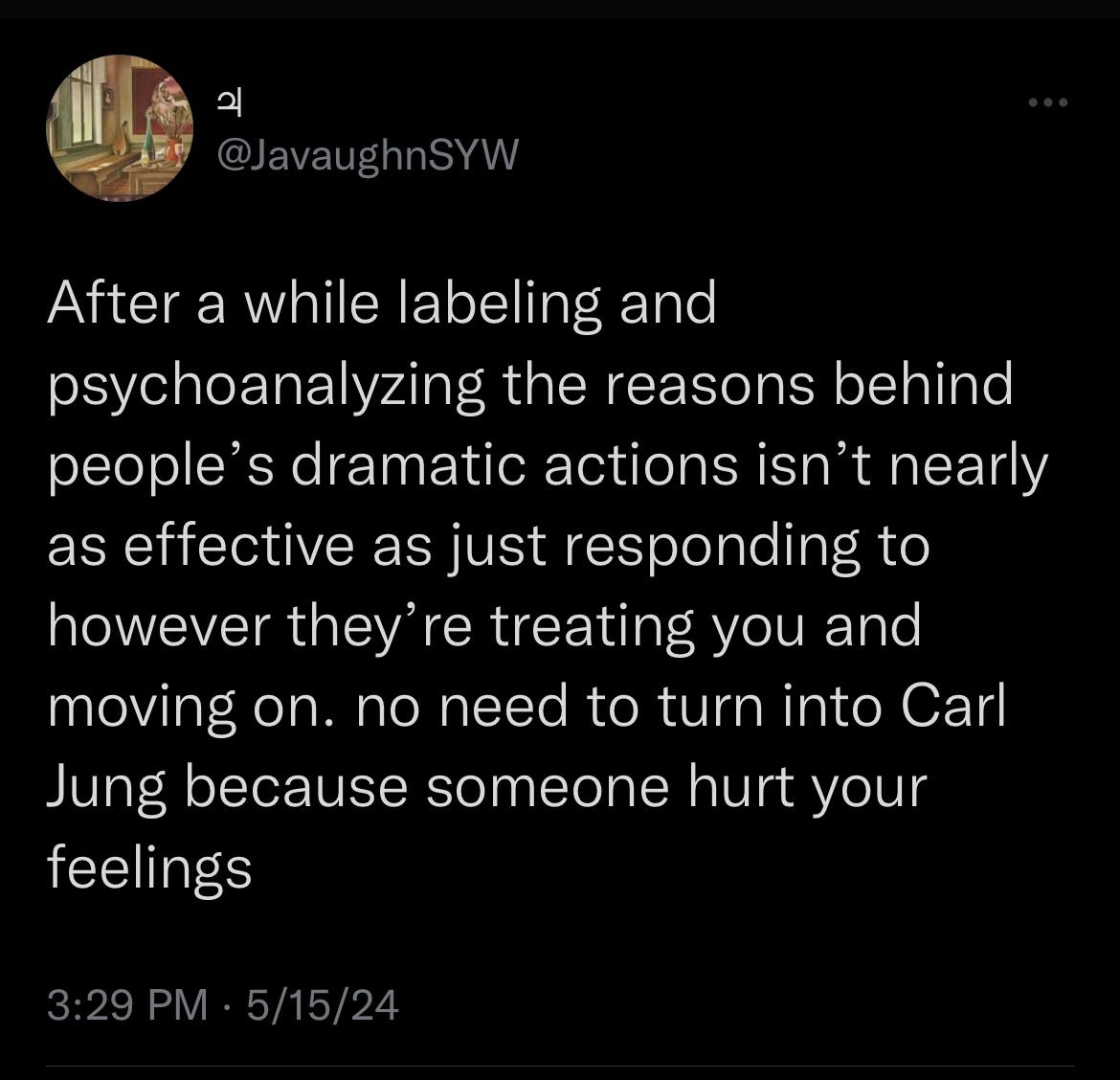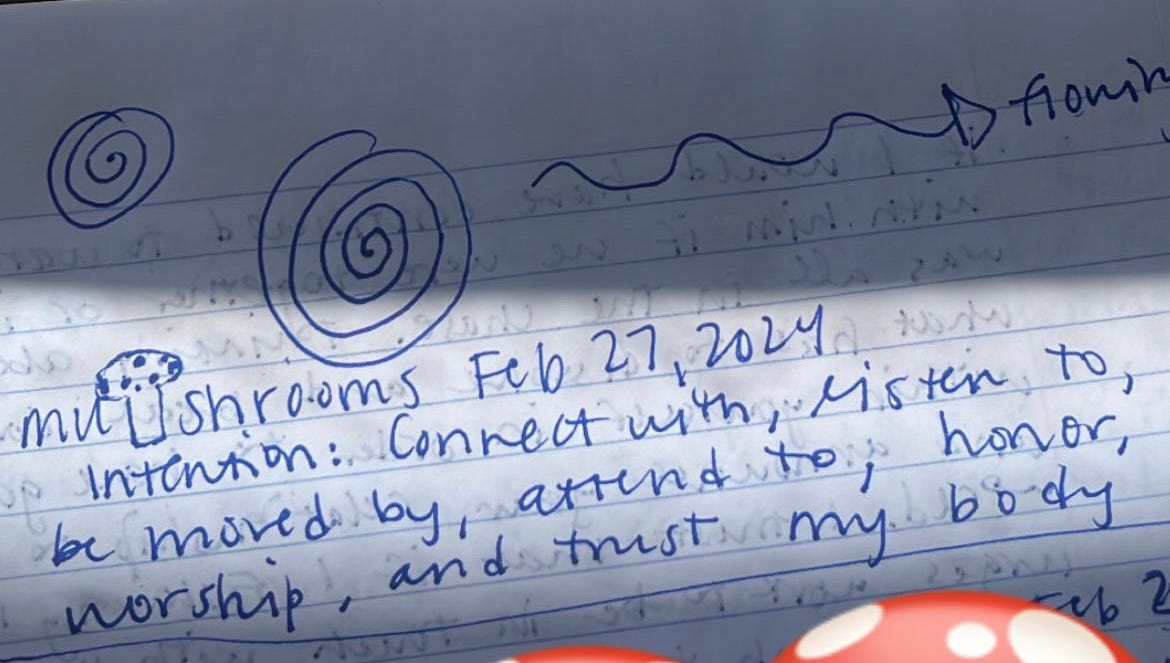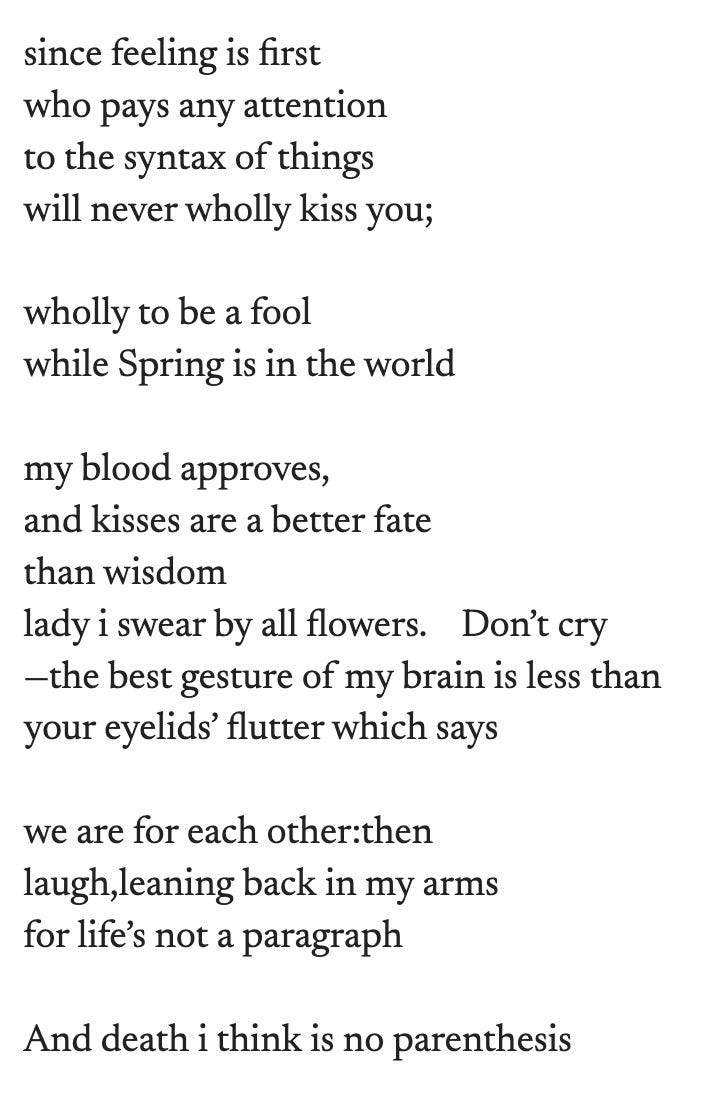I like to analyze the forensics of the forensics. I take a microscope to my actions and relationships, try to explain what’s going on and why. Then I take it a step further and analyze my analysis, looking for my own blind spots and reasons I might gravitate towards one conclusion over another. I journal three full pages everyday and I was in talk therapy for years; the cerebral part of introspection comes easily to me. In many ways these inquiries into self-awareness have helped me forge deeper connections with myself and others, but in the past year I’ve felt myself come up against the limits of this type of inner work. At what point am I just spinning my wheels, giving myself the illusion of doing something productive for my psyche and my life while I stay in the well-worn grooves of my own mind?
Recently, after talking separately to five different friends about a specific situation over the course of a week, I felt exhausted from all the verbal processing and irritated with other peoples’ opinions (which I had invited). In particular, I spent one dinner out with a friend trying to recount all the details of a long story, so much so that it felt burdensome to try to eat in between talking. Smoked aubergine, hummus, fried cauliflower with tomatina cream and grapefruit, two of the most perfect balls of falafel I’ve ever had. After days of rehashing, I wish I had just savored the amazing food.
Soul echoes
Last year I lived with a lot of people with whom I developed strong connections. Looking back, I see how most of them weren’t forged through the lengthy one-to-one conversations I’d used as the primary vehicle to cultivate closeness with others in the past. Instead of hinging on lots of self-disclosure, our intimacy was strengthened through repeatedly experiencing that it was safe for me to be myself in our space, that I would be witnessed and accepted in all the ways I showed up (crying, cranky, confused, exhausted, experiencing the unexplainable blahs) and it wasn’t necessary to always tell the story of what was going on with me in order to express something, feel seen, or experience catharsis. As someone who’s been comfortable for a while with calling my friends and sharing all the details of my personal life, but also has spent much of the past few years navigating my day-to-day experience alone, this type of being witnessed was challenging and rewarding in new ways.
I saw one of those people the other week; she was one of the friends I spoke to about the situation I was turning over in my head. It was brief and I didn’t get into many granular details with her. Counter to my usual mode of diagnosing and deconstructing, excavating in the weeds of what happened, I expressed the core of my anger, shame, fear, competing desires. There was an acceptance of the complexity of the situation. I cried, we hugged, I gave myself permission to do what I was always going to do anyways, though I still felt scared and uncertain. As I practice this new way of relating, I see the ways in which constant analysis can serve as a shield—from being seen or facing what’s really there, from admitting uncomfortable truths. Like, there’s a lot I don’t know, there’s a lot I will never know. What will I choose anyways?
Stories, still
It feels slightly ironic to put words to this, like perhaps it’s antithetical to the project of trying to narrativize less and feel more. But I find that leaning into the raw experience of my emotions and senses actually allows me to simultaneously lean into the parts of my narrativizing brain that feel like gifts and strengths. I like trying to find precise language to describe things. I enjoy being understood through my words, which is not always possible or necessary, but can absolutely hit with the right person at the right time. I think I’ll always rely on my analytical skills to understand myself and my relationships to some extent, and I appreciate the puzzle of constructing a personal essay, famously the preferred medium of cerebral, neurotic people.
But what if even the act of speaking or writing, trying to craft this elusive, perfect story that will communicate the truth of things, could be a process that’s less effortful and preoccupied with anxieties about how the message comes out? What if I trusted that the essence of every piece of information already exists and I’m not fully in control of when or how it lands, or with whom? As I feel more embodied, it helps unblock my writing. I can be a channel for feelings and ideas and stories and the creations don’t have to be perfect, because I know they’re approximations of the thing itself, and that’s okay. They don’t have to be understood fully by everyone, they can’t. Meanwhile I grow more comfortable with being a mystery to myself and others, at least on the level of language. We can still find each other in other ways.
Allowing for unfolding
In a recent essay from Persinette: “i could speak my truth, sure. but how do i trust any interpretive measure i would use to unpack that truth? how would i see it as anything other than an interpretation—a guess based on whatever ideological framework i’m most invested in at the time, whether that be psychology, a certain type of spirituality, some recently relevant political theory? at the end of the day i have to accept that anything i feel deep in my heart could mean anything at all.”
I’m starting to accept that I don’t need to know the meaning behind what I feel deep in my heart, especially when the search for it is steeped in a struggle and repetitiveness that keeps me from some of the real stuff of life. I will never reach a point of complete objectivity, my perspective unburdened by every experience I’ve had since birth, so if that’s the goal of self-analysis, it’s an impossible one. Instead, I can make decisions from a more instinctual place and trust that I will still learn the lessons I need to if I’m meeting my experience with presence, compassion, and love. My body signals what feels right and what doesn’t in all sorts of ways I’m learning to pay attention to.
For a long time I’ve been scared of what happens when you really, truly let go. Stop second guessing where your motivations come from, if they’re “legitimate” or not, and just express, act, know that it will be messy and raw and full of mistakes, being understood and misunderstood, hurting and being hurt. In some ways I’ve characterized this as a concession, like I’m turning my back on all the things that make me self-aware and can help me live a more rich, aligned life. I no longer think that’s true, nor do I think I’m opting to do whatever I want in every moment and ignore the consequences. I realize now that it doesn’t have to be wholly reckless, that I avoid it because it feels scary. But the risks inherent to living can’t be eradicated through enough thinking. I’m ready to let something else steer the ship for a while.







